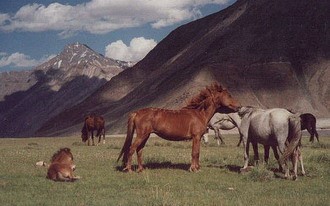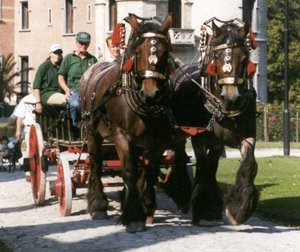 Zanskari Pony
Zanskari Pony
 Zanskari Ponies are bred in the high altitude Zanskar region
of Ladakh in eastern Jammu and Kashmir State of India. They are very similar to
Spiti ponies but they are more adaptable for higher altitude where they are
used as work horses.
Zanskari Ponies are bred in the high altitude Zanskar region
of Ladakh in eastern Jammu and Kashmir State of India. They are very similar to
Spiti ponies but they are more adaptable for higher altitude where they are
used as work horses.They stand 120-140 cm in height, and weigh 320-450 kg. Their coloration runs from usually grey to black, though some specimens are a reddish, coppery color. They are able to carry heavy loads at high altitude and are used for work. They are well built with prominent eyes, fine, long glossy hair, and a long heavy tail.
Zansikari Ponies are strong and hard workers. They can carry heavy loads at high altitudes. They are also used for pleasure riding and showing, as well.

 Zeeland
Zeeland
 Zeeland horses, or Zeeuwse Trekpaard, are an old Dutch Breed
that was influential in the development of the Belgian and Dutch draft horses.
Dutch and Belgian carriage horses are very similar and their registries will
often take animals from the other country. It is thought that the breeding of
the Zeeland horse began early in the 17th century. Initially they were
developed not only as a carriage horse, but as a robust workhorse for wartime,
agriculture, and mining. In fact, a large portion of the Dutch economy depended
on the strength of these animals. They were highly prized animals well into the
20th century when mechanical transport became more effective. However, after
the Second World War, Zeeland horses became more of a pleas
...
Zeeland horses, or Zeeuwse Trekpaard, are an old Dutch Breed
that was influential in the development of the Belgian and Dutch draft horses.
Dutch and Belgian carriage horses are very similar and their registries will
often take animals from the other country. It is thought that the breeding of
the Zeeland horse began early in the 17th century. Initially they were
developed not only as a carriage horse, but as a robust workhorse for wartime,
agriculture, and mining. In fact, a large portion of the Dutch economy depended
on the strength of these animals. They were highly prized animals well into the
20th century when mechanical transport became more effective. However, after
the Second World War, Zeeland horses became more of a pleas
...

 Zemaituka
Zemaituka
Their story stretches back to the 16th century, when they served as loyal companions to Lithuanians, assisting with farm work and transportation. Their journey wasn''t solitary, marked by influences from various exotic breeds. In the 19th century, Arabian blood coursed through their veins, adding a touch of refinement. By the 20th century, two distinct types emerged: a lighter, more refined group (but rarer in number) and a heavier type retaining its robust physique.
Once cherished for their practicality, the ...

 Zweibrücker
Zweibrücker
 Zweibrücker, or Zweibrücken, are warmblooded horses that
were originally bred at the state-owned stud facilities in Zweibrücken, Germany
(one of Germany’s smaller state run facilities.) However since 1977 they have
been breed under the jurisdiction of the Horse Breeders'' Association of Rhineland-Palatinate-Saar
(PRPS). Modern Zweibrücker horses are elegant, large-framed, correct sport
horses with powerful, elastic gaits suitable for dressage, show jumping,
eventing, and combined driving.
Zweibrücker, or Zweibrücken, are warmblooded horses that
were originally bred at the state-owned stud facilities in Zweibrücken, Germany
(one of Germany’s smaller state run facilities.) However since 1977 they have
been breed under the jurisdiction of the Horse Breeders'' Association of Rhineland-Palatinate-Saar
(PRPS). Modern Zweibrücker horses are elegant, large-framed, correct sport
horses with powerful, elastic gaits suitable for dressage, show jumping,
eventing, and combined driving.
The Zweibrücker stud program was founded in the mid-18th century and populated with animals of noble bearing. These animals were carefully crossed and further improved upon until 1801 when the farm was moved. Napoleon saw several Z ...
